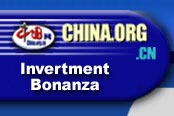|
China's commercial sector has been a hot investing point for foreign enterprises.
According to official statistics, so far, the number of foreign-funded commercial enterprises has exceeded over 300 around country with a total investment of US$2 billion, while their sales volumes have reached 100 billion yuan (US$12.05 billion) over the last year.
A spokesman with the Ministry of Foreign Trade and Economic Co-operation revealed that China is opening up its service trade market to the outside world and lifting restrictions on market admission for foreign enterprises step by step.
After introducing foreign capital to the retail sector, trials for attracting overseas investment into the wholesale sector have been carried out in Beijing, Tianjin, Shanghai and Chongqing.
"After China's accession into the World Trade Organization (WTO), we will gradually eliminate limitations on foreign enterprises entering China's wholesale and retail commerce sectors within three years and allow overseas companies to set up subsidiaries in the commodity circulation sector, which will surly create cut-throat competition for domestic competitors," the spokesman said.
Last month, France-based Carrefour, the world No 2 supermarket company after Wal-Mart of the United States, signed an agreement with Xiamen to open a chain store in the city by the end of this year. First-phase investment for the project will amount to 80 million yuan (US$9.64 million).
So far, Carrefour has set up 26 large supermarkets in 15 of China's key cities, including Beijing, Shanghai, Shenzhen and Dalian.
Moreover, a group of giant foreign retailers, including Wal-Mart and Price-Mart, have also established outlets in China, preparing to compete with their Chinese's counterparts and further tap the huge market.
Experts pointed out though, that the increase in foreign-funded retail enterprises will not threaten China's commercial institutions.
However, the opening up of the wholesale sector, especially the wholesale of imported commodities and products made by overseas companies in China, might threaten domestic wholesalers.
"Due to the small scale of various distribution and logistic centres and the separation of domestic and foreign trades, China's wholesale model can not meet the WTO's requirements for international commodity circulation," Zhang Guilin, a professor with the University of International Business and Economics, told China Daily.
He pointed out that urgent tasks for the country's commercial industry include strengthening co-operation with world-leading commercial companies, introducing advanced distribution technologies and management mechanisms in accordance with international practices and researching and developing new wholesale models based on e-business.
(China Daily 10/09/2000)
| 